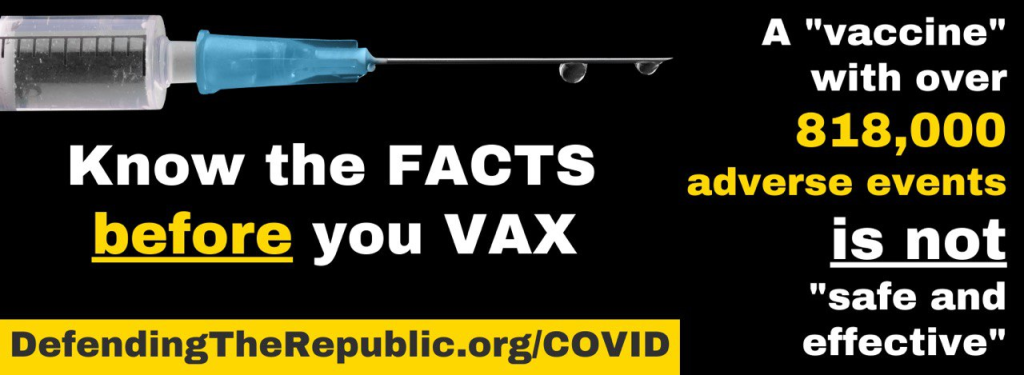Posted: 25 Oct 2021
The Swedish study shows that already after 4-6 months the effect of Pfizer’s vaccine was only 47%, and after 7 months the vaccine no longer protected against covid-19. AstraZeneca’s vaccine was ineffective after only 4 months, Modernas had the best effect, but still protected only to 59% after 6 months. But in addition, the effect for all vaccines was even worse and disappeared earlier for the fragile elderly and for men, ie the clear majority of those who die of covid-19 and whom the vaccine was intended to protect. However, the authors’ conclusion of the study is strange, yes, downright horrible.
They believe that the results show that a third dose must be given. The conclusion is incomprehensible, as the authors of the article have just shown that the vaccine is ineffective, especially for risk groups, and all vaccines are also based on the Wuhan virus, which was in circulation 1.5 years ago and in principle no longer spread.
The scale must also be placed: 1. the extremely high incidence of adverse reactions, which also affects women and people under the age of 60, two groups with a lower risk of dying from covid, significantly more severe than those at risk, and 2. that early treatment in outpatient care for high-risk people is very effective and reduces the mortality of covid-19 infection by 85%. This treatment has been applied in large parts of the world since April 2020, and on August 7 of the same year, the scientific article was published showing the powerful reduction in mortality.
In the autumn of 2020, this outpatient treatment should have been implemented throughout the world. Suggesting, based on today’s accumulated knowledge about the vaccine, their side effects and the effective treatment of the covid-19 infection, that the vaccination should continue is nothing but madness.
Lancet reference: https://papers.ssrn.com/sol3/papers.cfm?abstract_id=3949410
Abstract
Background: Whether vaccine effectiveness against Coronavirus disease 2019 (Covid-19) lasts longer than 6 months is unclear.
Methods: A retrospective cohort study was conducted using Swedish nationwide registries. The cohort comprised 842,974 pairs (N=1,684,958), including individuals vaccinated with 2 doses of ChAdOx1 nCoV-19, mRNA-1273, or BNT162b2, and matched unvaccinated individuals. Cases of symptomatic infection and severe Covid-19 (hospitalization or 30-day mortality after confirmed infection) were collected from 12 January to 4 October 2021.
Findings: Vaccine effectiveness of BNT162b2 against infection waned progressively from 92% (95% CI, 92-93, P<0·001) at day 15-30 to 47% (95% CI, 39-55, P<0·001) at day 121-180, and from day 211 and onwards no effectiveness could be detected (23%; 95% CI, -2-41, P=0·07). The effectiveness waned slightly slower for mRNA-1273, being estimated to 59% (95% CI, 18-79) from day 181 and onwards. In contrast, effectiveness of ChAdOx1 nCoV-19 was generally lower and waned faster, with no effectiveness detected from day 121 and onwards (-19%, 95% CI, -97-28), whereas effectiveness from heterologous ChAdOx1 nCoV-19 / mRNA was maintained from 121 days and onwards (66%; 95% CI, 41-80). Overall, vaccine effectiveness was lower and waned faster among men and older individuals. For the outcome severe Covid-19, effectiveness waned from 89% (95% CI, 82-93, P<0·001) at day 15-30 to 42% (95% CI, -35-75, P=0·21) from day 181 and onwards, with sensitivity analyses showing notable waning among men, older frail individuals, and individuals with comorbidities.
Interpretation: Vaccine effectiveness against symptomatic Covid-19 infection wanes progressively over time across all subgroups, but at different rate according to type of vaccine, and faster for men and older frail individuals. The effectiveness against severe illness seems to remain high through 9 months, although not for men, older frail individuals, and individuals with comorbidities. This strengthens the evidence-based rationale for administration of a third booster dose.
Funding: None to declare.
Declaration of Interest: None to declare.
Ethical Approval: This study was approved by the Swedish Ethical Review Authority (number 495/2021)
Keywords: Covid-19 infection, Vaccination
_______________________________
If you are looking for solutions (lawyer, form, gathering, action, maybe this could help you:
HERE
If you like our work please consider to donate :



 RSS Feed
RSS Feed















 November 11th, 2021
November 11th, 2021  Awake Goy
Awake Goy  Posted in
Posted in  Tags:
Tags: 













